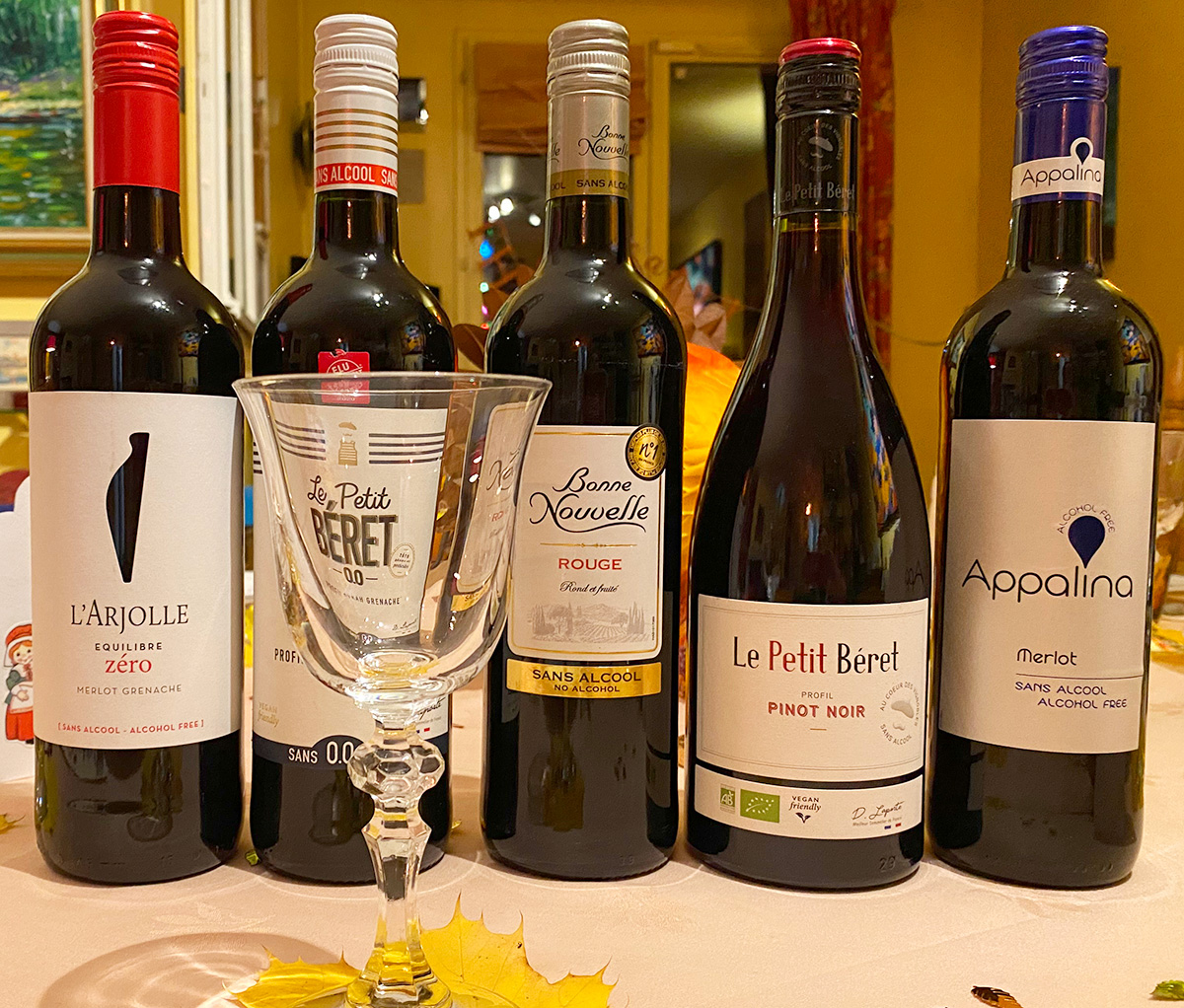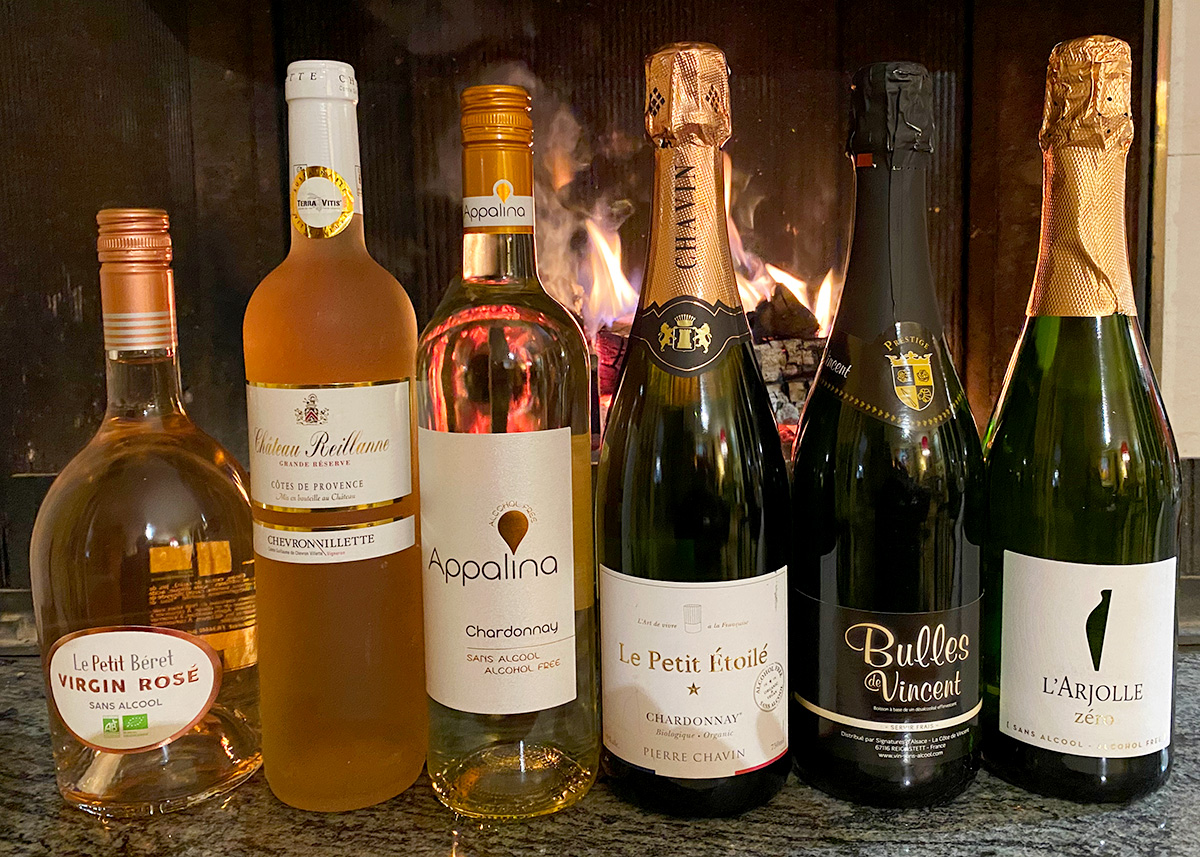We tested non-alcoholic wine. Yes it exists! And it is a pleasure to drink! Plus there are all the benefits of wine minus the big negatives: alcohol and mega calories. Whether you want to go dry for January or just enjoy wine without headaches, this is a nice product.

Here’s how I came to try these products that are still rather a secret. I like red wine, but I’ve decided to reduce my alcohol, so I went looking for something else to drink with dinner that is enjoyable and pretty and doesn’t overpower the meal – that’s why we like wine isn’t it? I like to pour into a pretty glass; I enjoy the gesture and the color of wine which is part of why I’ve not been able to find anything else that I want to drink at dinner. I love water, but I gulp it when I drink it, so it is not for dinner when I want to sip. I love fruit juice, but it is too heavy and sugary for dinner (and as a friend so aptly mentioned “too interfering”). I’m using my same wine glasses and amounts and I’ve thought to myself I could have more of this!
What is alcohol-free wine?
There are two types of wine-like drinks without alcohol. There are the ones that first were regular fermented wine from which the alcohol was removed. These are the closest to real wine. Then there are those which were not fermented and made with an infusion of grapes, grape seeds and oak flavors.
One of the non-fermented wines is Le Petit Béret, which was created by a meilleur sommelier de France. Dominique LAPORTE « constructs aromatic assemblies » as he says. His ambition is to make products from reputable southern French vineyards available without alcohol and organically. It took 5 years of research and innovative technology to make it work and he created a dozen reds, rosés, whites and effervescents suitable for vegans, athletes, diabetics (low sugar), those who are driving home, who want to sleep better and have better concentration.
What does it taste like?
The whole idea is to have a different drink. So while I’m used to red wine, when tasting these new drinks I decided to try to resist comparing them to wine and just compare them to each other to find one or two that I like. I can only describe them simply, not having a connaisseur’s vocabulary or trained palette.
But I can’t really figure out what it tastes like! It’s not salty, bitter or umami so that leaves sour and sweet. The first thing that came to mind is “sour grapes”. I don’t mean that negatively. It’s just what it tastes like in the most basic sense (and wine tastes like sour grapes + alcohol, right?). It’s not bad a bad flavor, it’s tangy and sweet, but it needs getting used to, like any new taste. Do you remember your first taste of coffee or beer? I do. Yuck. I recently tried bissap, a hibiscus drink from western Africa. Bissap grew on me gently after a surprising first sip that made me pucker. And for that matter wine itself took getting used to. And still when I switch from one vintage to another it is always a bit of a surprise.
I find non-alcoholic wine to be “juicy”. Globally they look good in the glass (except for the two bottles of “prestige” that were all cloudy – it tasted fine, but it was odd looking). Some are sweeter than others. They are all quite palatable and go nicely with a meal. You can really taste the flavors of the mixture since they are not covered with alcohol. In fact I’m finding now that “real” wine smells and tastes mostly like alcohol with a little grape. Funny how you get used to things.
I gave a friend the Petit Etoilé Sparkling Chardonnay, which has a pretty pale yellow color, for her birthday. Here’s what she said: “We’re drinking the fake champagne—it’s in fact, surprisingly, really really good! It’s not “brut” but has a really pleasant flowery taste and nose. [she’s got the terminology that I lack] Nothing to do with cider or carbonated beverages. [My French husband] Frederic really liked it (I was shocked!!); again, we didn’t compare it to champagne but it had a unique flavor that marries well with both nibbles and meal. Frederic thought it was interesting that the first ingredients were infusions of oak and grape seeds, as wine is aged in oak casks, and the seeds are mashed into the wines.” For the record this is also a drink without fermentation. Gueule de Joie (get the pun? a play on words with gueule de bois or hangover), a website specializing in alcohol-free wines and liqueurs, describes it like this:
“The Petit Étoilé organic sparkling Chardonnay without alcohol reveals delicate bubbles that are both fine and persistent. The color is pale yellow, with shiny and silvery reflections. The nose has aromas of white flowers, green apple and white pear which combine with pleasant lemony and buttery notes. The palate presents a creamy and caressing foam, revealing citrus flavors of incomparable freshness.”
My favorite red turns out to be Arjolle Merlot Grenache blend. It is the least sweet and most acidic of the reds I tried. It’s flavor is full of berry and rounder than the others perhaps because this one is made by the dealcoholization process and thus still contains a trace amount of alcohol. L’Arjolle produces wines with and without alcohol.
Opia Chardonnay tasted nice and fresh like a peach kir.
Another thing I noticed about the alcohol-free is that I’m not as full as there are less calories. It is amazing how I’ve wanted to eat more to feel sated. So I did, but those calories were better ones… not fat-producing, blood pressure raising, alcohol and sugar.
So how is non-alcoholic wine made?
There are two main ways in which alcohol can be removed from wine. The most popular way is through vacuum distillation, a process that heats the wine and allows the ethanol to evaporate. Producers of alcohol-free wine are very careful to heat the wine to the lowest possible temperature allowing evaporation to take place without cooking the wine. The ethanol removed from wine, a bonus by-product, can be used to create other products requiring ethanol.
The second way is through reverse osmosis which uses a significant amount of water. This method is less environmentally friendly for two reasons: lots of water use and ethanol that cannot be used as it is too diluted.
Gueule de Joie describes how an infused drink is made:
« After de-stemming and crushing the grapes, a maceration is carried out cold, at around 4 ° C for 8 hours. Maceration and allows all the beneficial compounds to be extracted from the grape. Just like for a champagne, a dose of liqueur made from organic Chardonnay musts is added before bottling. The pressure and bubbles are obtained by injecting natural carbon dioxide at low temperature. »

Alcohol-free wine can be hard to find
One big bummer of these drinks (Technically non-alcoholic wine cannot be called wine, the marketing folks are looking for the new word that will catch on, but it hasn’t been found yet… ) is that they are a bit hard to find and pretty much all have to be ordered online. Not wanting to have bottles shipped from every which way I decided to use the centralized Gueule de Joie which offers lots of choices and sample packs. The products costs between 7 and 12 euros which isn’t bad, but once you add shipping (from Nantes) you’re at about 10-15 euros each. They said I earned points for my order, but I don’t know what the points are good for. The company has been in business 3 years and offers non-alcoholic wine from France and Germany as well as alcohol-free beers and spirits. We met Jean-Philippe Braud from Gueule de Joie during our trip to Nantes and he was a happy entrepreneur who very much appreciates his own product. He is expanding his business and sees the market expanding too. He hopes to see these products available in bars and restaurants soon to give people choice while they are out. I did also find a few non-alcoholic wines in grocery stores which despite costing just 3€ weren’t too bad.
Just a note: these drinks do not mature and have a shelf life of about 2 years. Once opened they should be kept in the fridge for no more than 3 days although in my experience the whites last longer.
There’s finally a couple shops in Paris
- Déjà Bu 4 rue Popincourt, 75011 Paris
- Le Paon qui Boit 61, rue de Meaux – 75019 Paris https://le-paon-qui-boit.odoo.com/. The Drinking Peacock mentions lots of tastings on their site.
- Xavier Sans Alcool 27 rue Bleue, 75009 Paris https://xavieralcoolsansalcool.com/
#dryjanuary or #LeDéfiDeJanvier is if you want to give going without alcohol a try for a month.
Stay tuned for an upcoming non-alcoholic wine tasting at Bill & Rosa’s Book Room. Date to be determined.

